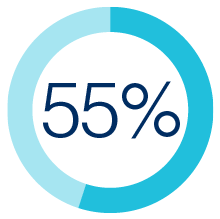Widening participation
A record number of bursaries were awarded to undergraduate students from low income households in the 2015-16 academic year, reflecting the University’s commitment to increase diversity and equal opportunities for students from a range of backgrounds.
Bursary support

More than £8.8 million was provided through the bursaries, the highest total to date. The provision of bursaries has increased recruitment of students from low income households and socio-economically disadvantaged areas. Edinburgh’s efforts to support care leavers was recognised through the award of the Frank Buttle Trust Quality Mark, which acknowledges support provided for care leavers entering higher education.
Projects
We engage thousands of prospective students annually via large on campus events as well as one-to-one individual capacity building projects such as Pathways to the Professions, Reach and ACES. We support the student journey from primary school, through secondary school and beyond with provision for adult returners through our access course and Credit for Entry routes. We continue to support regional and national collaborative partnership projects by hosting and providing management and services support to LEAPS, SHEP and SWAP.
- LEAPS entrants – in 2015/16, 24.1% of Scottish domiciled entrants at the University of Edinburgh were on LEAPS, SWAP on Steven College programmes
- SHEP data – in 2015/16, 8.9% of Scottish domiciled entrants at the University of Edinburgh were from SHEP schools
- Low performing schools – in 2015/16, 5.7% of Scottish domiciled entrants at the University of Edinburgh were from low performing schools
- Scottish Accommodation Bursary – in 2015/16, 15% of Scottish domiciled entrants at the University of Edinburgh had taken up this bursary.
The Educated Pass Project
The pattern of lower school attainment and Higher Education participation amongst male pupils, compared to female pupils, is well documented in the academic literature – and it continues to be of concern. Emphasising the importance of the issue, the Scottish Funding Council’s recent Gender Action Plan, included an aim to reduce the gap between male and female participation in undergraduate study to five percentage points by 20302.
Since 2006, Educated Pass (EP) has addressed the academic under achievement and under engagement of boys – working with those in S2 prior to their first curriculum choices. In order to promote participation and engagement with learning, a sophisticated approach is needed. Boys are targeted through their local youth football clubs to engage in the educational opportunities available to them in Higher and Further Education.
Drawing on early notions of Olympism (Olympic Charter 2007); ‘Blending sport with culture and education’, this is delivered through ‘the educational value of good example’. This is very much built on the principle of interdisciplinary learning and aligned with the four capacities of the curriculum for excellence; being successful, effective, responsible and confident learners.
The boys undertake eight sessions over a twelve month period designed to build upon their commitment to sport and generate a similar interest and commitment in their education. The initiative brings relevance to both.
The most recent Educated Pass tracking report demonstrated continued success with this programme as these metrics show:
- In our most recent tracking report 87% of participants stayed on to S5 compared with a national average of 84% of males. Likewise, 61% of participants stayed on to S6 compared with a national average of 55% of males
- A total of 98% of participants left school for a positive destination compared with a national average of 90% for males. (A positive destination is defined as further or higher education, training or employment.)
- Of those students that completed S6, 38% went on to higher education compared with a national average of 33% for males.
- In total 16 participants have gone on to become Edinburgh students.

